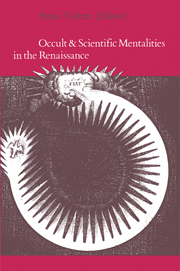Book contents
- Frontmatter
- Contents
- List of contributors
- Editor's preface
- Introduction
- 1 At the crossroads of magic and science: John Dee's Archemastrie
- 2 The occult tradition in the English universities of the Renaissance: a reassessment
- 3 Analogy versus identity: the rejection of occult symbolism, 1580–1680
- 4 Marin Mersenne: Renaissance naturalism and Renaissance magic
- 5 Nature, art, and psyche: Jung, Pauli, and the Kepler–Fludd polemic
- 6 The interpretation of natural signs: Cardano's De subtilitate versus Scaliger's Exercitationes
- 7 Kepler's attitude toward astrology and mysticism
- 8 Kepler's rejection of numerology
- 9 Francis Bacon's biological ideas: a new manuscript source
- 10 Newton and alchemy
- 11 Witchcraft and popular mentality in Lorraine, 1580–1630
- 12 The scientific status of demonology
- 13 “Reason,” “right reason,” and “revelation” in midseventeenth-century England
- Index
13 - “Reason,” “right reason,” and “revelation” in midseventeenth-century England
Published online by Cambridge University Press: 12 January 2010
- Frontmatter
- Contents
- List of contributors
- Editor's preface
- Introduction
- 1 At the crossroads of magic and science: John Dee's Archemastrie
- 2 The occult tradition in the English universities of the Renaissance: a reassessment
- 3 Analogy versus identity: the rejection of occult symbolism, 1580–1680
- 4 Marin Mersenne: Renaissance naturalism and Renaissance magic
- 5 Nature, art, and psyche: Jung, Pauli, and the Kepler–Fludd polemic
- 6 The interpretation of natural signs: Cardano's De subtilitate versus Scaliger's Exercitationes
- 7 Kepler's attitude toward astrology and mysticism
- 8 Kepler's rejection of numerology
- 9 Francis Bacon's biological ideas: a new manuscript source
- 10 Newton and alchemy
- 11 Witchcraft and popular mentality in Lorraine, 1580–1630
- 12 The scientific status of demonology
- 13 “Reason,” “right reason,” and “revelation” in midseventeenth-century England
- Index
Summary
In the beginning of Time, the great Creator Reason, made the Earth to be a Common Treasury to preserve … Man.
This work to make the Earth a Common Treasury was shewed to us by Voice in Trance, and out of Trance, which words were these, “Work together, Eate Bread together, Declare this all abroad”: which Voice was heard three times.
Thus spake Gerrard Winstanley in 1649. How novel was this kind of dual appeal to reason and revelation? This chapter explores the usages of the word “reason” (and its cognates) by Winstanley's contemporaries. It follows the prescriptions sketched by J. G. A. Pocock in attempting to “write the history of debates conducted in a culture where paradigms and other speech structures overlapped and interacted; where there could be debate, because there was communication, between different ‘languages’ and language-using groups and individuals.”
It is a commonplace that the religious and political controversies of mid-seventeenth-century England were concerned with the “right reading” of God's will. The all-important issue for the opponents of orthodoxy in the ideological war was to establish that their own interpretations of the divine will were right, being based on an unchallengeable source; to undermine the rationale for existing institutions they claimed for themselves indubitable insights – insights derived from private illumination of the spirit. While this battle of ideas raged in the political and religious arenas, a parallel struggle occurred over rival interpretations of God's determinations in the natural order. The reemergence of the writings of Hermes Trismegistus meant that in the realm of nature, too, knowledge must be based on an illuminist epistemology.
- Type
- Chapter
- Information
- Occult Scientific Mentalities , pp. 375 - 402Publisher: Cambridge University PressPrint publication year: 1984
- 1
- Cited by



